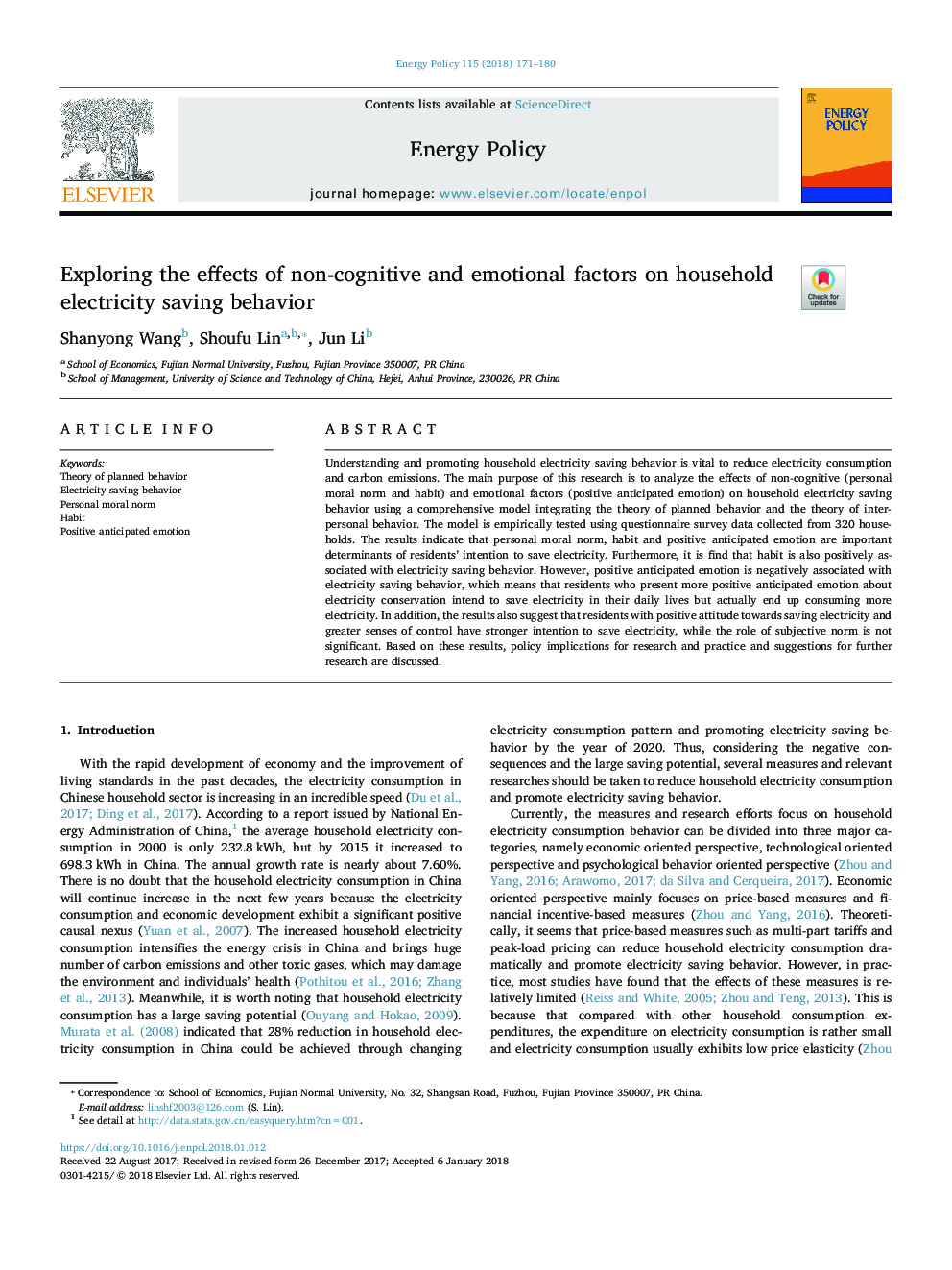| کد مقاله | کد نشریه | سال انتشار | مقاله انگلیسی | نسخه تمام متن |
|---|---|---|---|---|
| 7397549 | 1481243 | 2018 | 10 صفحه PDF | دانلود رایگان |
عنوان انگلیسی مقاله ISI
Exploring the effects of non-cognitive and emotional factors on household electricity saving behavior
ترجمه فارسی عنوان
بررسی تأثیر عوامل غیر شناختی و عاطفی بر رفتار صرفه جویی در مصرف برق خانگی
دانلود مقاله + سفارش ترجمه
دانلود مقاله ISI انگلیسی
رایگان برای ایرانیان
کلمات کلیدی
نظریه رفتار برنامه ریزی شده، صرفه جویی در مصرف برق، اخلاق اخلاقی شخصی، عادت، احساس مثبت پیش بینی شده،
ترجمه چکیده
درک و پیشبرد رفتارهای صرفه جویی در مصرف برق خانوار برای کاهش مصرف برق و انتشار کربن حیاتی است. هدف اصلی این پژوهش، بررسی تأثیرات غیرخودی شناختی (عرف و عادت اخلاقی شخصی) و عوامل هیجانی (احساسات پیش بینی شده مثبت) بر رفتار صرفه جویی در مصرف برق خانوار با استفاده از یک مدل جامع، تلفیق نظریه رفتار برنامه ریزی شده و نظریه بین فردی رفتار - اخلاق. این مدل از لحاظ تجربی با استفاده از داده های جمع آوری اطلاعات پرسشنامه از 320 خانوار مورد آزمایش قرار گرفته است. نتایج نشان می دهد که اخلاق اخلاقی فردی، عادت و احساسات پیش بینی شده مثبت، تعیین کننده های مهم اهداف ساکنین برای صرفه جویی در مصرف برق هستند. علاوه بر این، می بینیم که عادت نیز با رفتار صرفه جویی در مصرف برق رابطه مثبت دارد. با این حال، احساسات پیش بینی شده مثبت با رفتار صرفه جویی در مصرف برق منفی منفی است، به این معنی که ساکنین که احساسات پیش بینی شده ای در مورد صرفه جویی در مصرف برق دارند، قصد دارند که در زندگی روزمره خود، صرفه جویی در مصرف برق داشته باشند، اما در عوض مصرف برق بیشتری دارند. علاوه بر این، نتایج نیز نشان می دهد که ساکنان با نگرش مثبت نسبت به صرفه جویی در مصرف برق و حواس کنترل بیشتر قصد قوی تر برای صرفه جویی در مصرف برق دارند، در حالی که نقش الگوی ذهنی قابل توجه نیست. بر اساس این نتایج، پیامدهای سیاست برای تحقیق و عمل و پیشنهادات برای تحقیقات بیشتر مورد بحث قرار گرفته است.
موضوعات مرتبط
مهندسی و علوم پایه
مهندسی انرژی
مهندسی انرژی و فناوری های برق
چکیده انگلیسی
Understanding and promoting household electricity saving behavior is vital to reduce electricity consumption and carbon emissions. The main purpose of this research is to analyze the effects of non-cognitive (personal moral norm and habit) and emotional factors (positive anticipated emotion) on household electricity saving behavior using a comprehensive model integrating the theory of planned behavior and the theory of interpersonal behavior. The model is empirically tested using questionnaire survey data collected from 320 households. The results indicate that personal moral norm, habit and positive anticipated emotion are important determinants of residents' intention to save electricity. Furthermore, it is find that habit is also positively associated with electricity saving behavior. However, positive anticipated emotion is negatively associated with electricity saving behavior, which means that residents who present more positive anticipated emotion about electricity conservation intend to save electricity in their daily lives but actually end up consuming more electricity. In addition, the results also suggest that residents with positive attitude towards saving electricity and greater senses of control have stronger intention to save electricity, while the role of subjective norm is not significant. Based on these results, policy implications for research and practice and suggestions for further research are discussed.
ناشر
Database: Elsevier - ScienceDirect (ساینس دایرکت)
Journal: Energy Policy - Volume 115, April 2018, Pages 171-180
Journal: Energy Policy - Volume 115, April 2018, Pages 171-180
نویسندگان
Shanyong Wang, Shoufu Lin, Jun Li,
